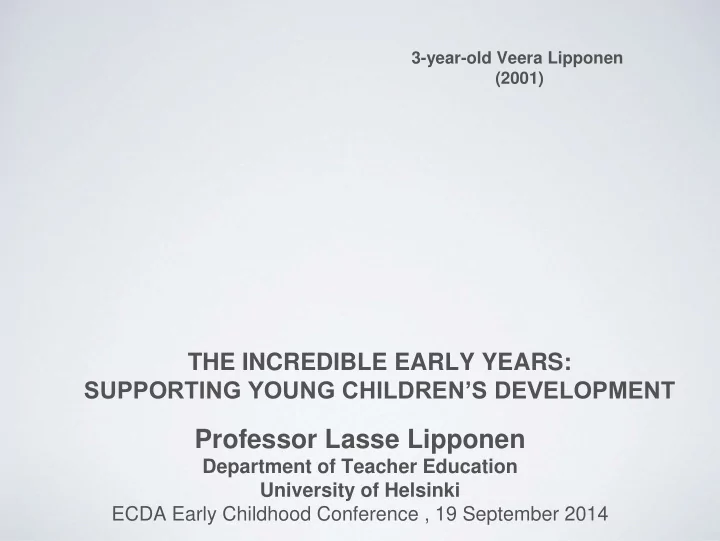

3-year-old Veera Lipponen (2001) THE INCREDIBLE EARLY YEARS: SUPPORTING YOUNG CHILDREN’S DEVELOPMENT Professor Lasse Lipponen Department of Teacher Education University of Helsinki ECDA Early Childhood Conference , 19 September 2014
• Why are early years so important? • What we know about learning and development in early years? • How can educators support learning and development in early years?
WHY ARE EARLY YEARS SO IMPORTANT?
A growing interest in early years!
• Economic rationale • ECE is a best economical investment in preventing risk of social exclusion/marginalization/alienation (Carneiro et al., 2003; Heckman, 2006; Hecman & Masterov, 2004; see also Paananen, Lipponen & Kumpulainen, 2014; Paananen, Kumpulainen & Lipponen, 2014)
• Educational rationale • High quality ECE has long-term effects/impact. It predicts later academic competence (Vandell, et al., 2010) • Teacher influence persists in early grades. Starting in kindergarten, teachers can significantly affect students’ reading and math scores in later grades (Konstantopoulos, 2011; Konstantopoulos & Chung, 2011) - The best teachers for the smallest children • Childhood has absolute value
• Societal rationale • Equal opportunities for all Children’s well -being •
• Developmental (learning) rationale • Core developmental changes and learning take place in early childhood (Bransford et al.,1999; Bruner, 1987; Meltzoff et al., 2009; Piaget, 1928; Vygotsky, 1978) • Early years are full of developmental and learning opportunities
WHAT WE KNOW ABOUT LEARNING AND DEVELOPMENT IN EARLY YEARS?
• Three common arguments/perceptions concerning learning and development in early years:
1. Newborn’s mind is a tabula rasa (blank slate) that • needs to be filled with knowledge?
• 2. Young children know and can do little, but with age (maturation) and experience (of any kind) they become increasingly competent?
• 3. Young infants cannot speak, walk, use tools so they are born totally immature?
Wrong!
……..Because……
We humans are biologically wired and…
• What does it mean that we are biologically wired to learn?
• To be biologically wired to means that we have early predisposition to learn • Infants have competencies that biologically predispose us to learn • Innate knowledge: Positive biases to learn types of information readily and early in life
• What does it mean that we are culturally tuned to learn?
• Human infants possess powerful implicit learning mechanisms that are affected by social interaction • Three social skills (social understanding) are foundational to human development and are rare in other animals (Meltzoff et al. 2009): • Imitation • Shared attention/mind reading • Empathic understanding
• Children develop only in relationships to others (Vygotsky, 1978) • Primary interest in other people and their behavior • The primary goal of humans is to be an accepted and valued part of society • Learning is culturally mediated: We learn to master those skills, ideas, values that our culture mediates (Vygotsky, 1978)
HOW CAN EDUCATORS SUPPORT LEARNING AND DEVELOPMENT IN EARLY YEARS?
• The re-conceptualization of the child and childhood • Learning is strongly influenced by social interactions - educators in central role • All higher cognitive function have social origin (Vygotsky, 1978)
• Early years pedagogy? • Direct teaching or scaffolding learning and living together? Academic skills and ABC’s or something • else?
• Direct teaching or scaffolding and living together? • High quality interaction is regarded as crucial for effective pedagogy (Vygotsky,1978) • Responsive, reciprocal • View of the child: if children are the agents of their own learning (and life worlds) they should be treated like that (Lipponen, Kumpulainen & Paananen, 2014) Understanding children’s perspective and meaning • making (Rintakorpi, Lipponen & Reunamo, 2014; Lipponen, Kumpulainen & Paananen, 2014)
• Breaking the traditional model of teaching - IRE - initiation - reply - evaluation (Sinclair & Coulthard, 1975) • IRE appears to be universal/cross-cultural pattern of classroom interaction
• No sense of speaking verbal or non-verbal interaction • Social interaction entails always a use of multiple semiotic resources (language, tools, body) (Streeck, Goodwin & LeBaron, 2011)
Academic skills and ABC’s or social skills or…? • • Focusing too much on academic skills may inhibit child’s development - neglecting the power of emotions and hands on activities as a developmental force
• During early years teachers should focus on supporting the development and learning of • Social skills
• Social skills • Skills that help child to manage the everyday problem solving situations • Skills to be able to observe and read others intentions, desires, emotions Skills to evaluate the consequences of one’s • own behavior and emotions • Skills of making initiatives and responding to initiatives
• With and through play and playful learning
• Play (make-believe) and playful learning • Stimulates several abilities: fantasy, empathy, communication, symbolic thinking as well as collaboration and problem-solving, social skills, regulation of emotions, ‘mind reading and taking perspective’, negotiations and renegotiations (roles, rules, values, power), framing, controlling impulses, behaving in accordance with social expectations, control of fear
CONCLUSIONS • Early years are the most important years in human life • In early years, the focus should be on developing social skills • Play and playful activities and high quality interaction should be the core of early years pedagogy
• … one more thing …
• You are the most important people!
• http://plchelsinki.fi/ (Kumpulainen, Lipponen, Sintonen, Mertanen & Sairanen, 2014)
Recommend
More recommend